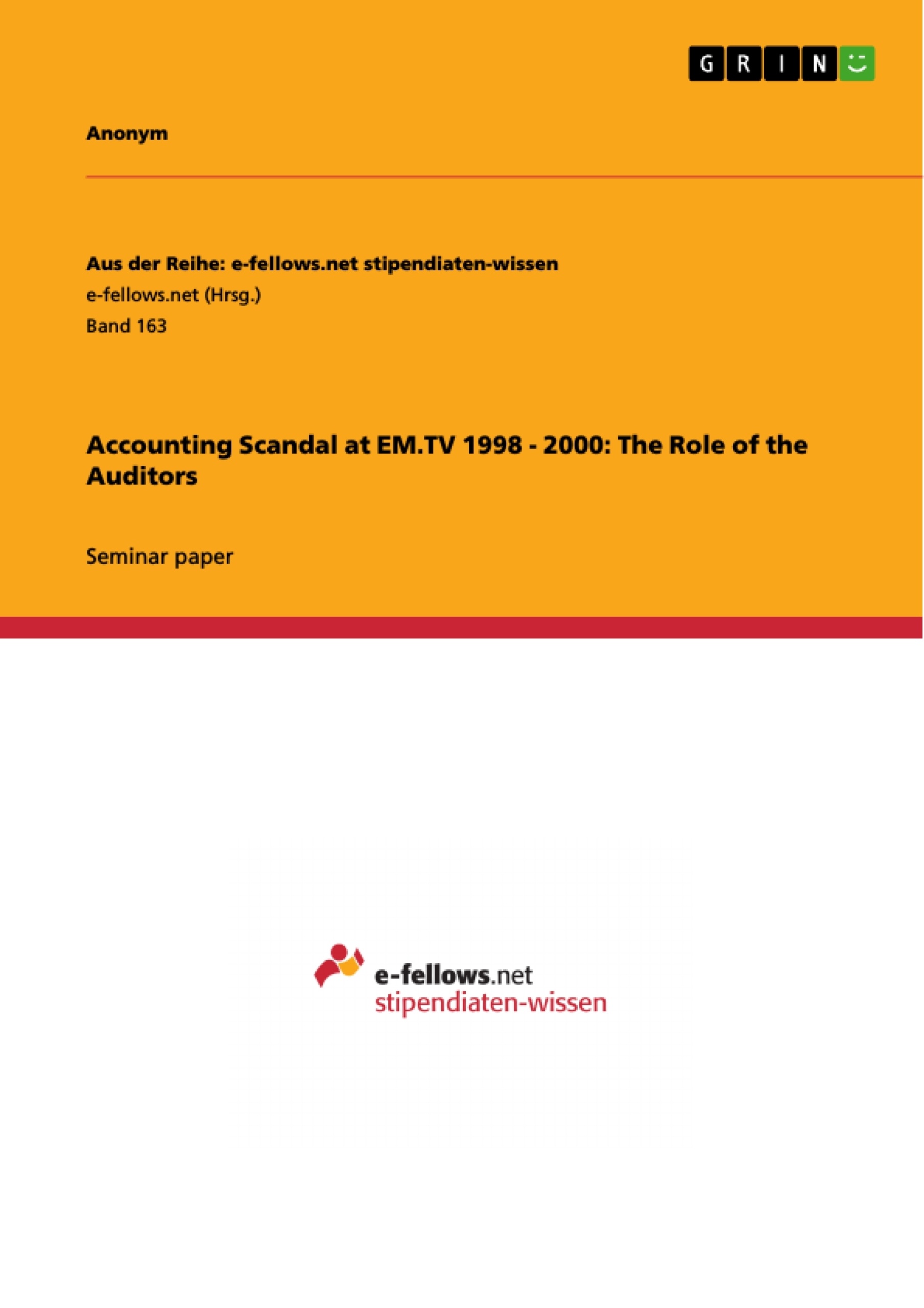With the accounting scandal around the Munich-based media company EM.TV in the years 1998-2000, the auditors’ profession caught unprecedented attention in Germany. As the society had just “discovered” stock markets for the broader masses, the burst of the dot-com bubble and especially EM.TV’s crash served as a painful warning signal that also in the equity markets, higher returns are not risk-free. Quickly after the full extent of EM.TV’s scandal became visible and clear, the investor community filed a lawsuit against the management, and also prepared to sue PricewaterhouseCoopers, which audited the financial statements.
This paper attempts to shine light on the EM.TV story, focusing on the role of the auditors. While definitely playing a central role, it will be shown that auditing in this particular case rather helped to dismantle the problematic issues and to reveal a more realistic assessment of the company’s financial health. I will first give a brief overview of the discussed company as well as the special stock market environment it operated in. Secondly, I will summarize the major accounting malpractices that, consequently, have made this issue so relevant for the topic of auditing. The main part will then analyze the auditing and accountability issues, in this case implemented by PriceWaterhouseCoopers (PwC), by outlining their approach and methodology, and the subsequent actions taken. This will then be drawn further to discuss and conclude with general effects on the auditing market, especially in Germany.
Inhaltsverzeichnis (Table of Contents)
- I. Introduction
- II. Background: EM.TV and the German “Neuer Markt” (New Market)
- III. Brief Overview of Accounting Malpractices
- IV. Analysis of the auditing and accountability issues
- V. Conclusion: Consequences for EM.TV and for the German Auditing Profession
Zielsetzung und Themenschwerpunkte (Objectives and Key Themes)
This paper aims to examine the role of auditors in the EM.TV accounting scandal that occurred between 1998 and 2000. It will explore how the auditors' actions contributed to uncovering and ultimately addressing the accounting irregularities within the company.
- The rise and fall of EM.TV within the German "Neuer Markt" (New Market).
- The nature of accounting malpractices committed by EM.TV.
- The auditing practices and actions taken by PricewaterhouseCoopers (PwC) in response to the accounting irregularities.
- The consequences of the EM.TV scandal for the auditing profession in Germany.
- The broader impact of the scandal on the German business environment.
Zusammenfassung der Kapitel (Chapter Summaries)
- I. Introduction: This chapter introduces the EM.TV accounting scandal and the subsequent focus on the auditors' role in the case. It highlights the significance of the scandal, particularly within the context of the emerging German stock market.
- II. Background: EM.TV and the German “Neuer Markt” (New Market): This chapter provides background information about EM.TV, its rapid rise in the German "Neuer Markt," and the role of its CEO, Thomas Haffa. It also explores the dot-com bubble environment and EM.TV's aggressive acquisition strategy.
- III. Brief Overview of Accounting Malpractices: This chapter details the specific accounting malpractices employed by EM.TV, including the questionable amortization of licenses, the manipulation of goodwill figures, and an aggressive revenue recognition policy.
- IV. Analysis of the auditing and accountability issues: This chapter examines the audit process and the actions taken by PwC, particularly their response to red flags and the growing concerns about EM.TV's accounting practices. It explores the changing dynamics between PwC and EM.TV management.
Schlüsselwörter (Keywords)
This preview focuses on the EM.TV accounting scandal, examining the role of auditors, particularly PricewaterhouseCoopers, within the context of the German "Neuer Markt" and the dot-com bubble. It analyzes the specific accounting malpractices employed by EM.TV and the subsequent auditing and accountability issues. Key terms include "accounting scandal," "auditors," "EM.TV," "Neuer Markt," "dot-com bubble," "accounting malpractices," "goodwill," "revenue recognition," "PricewaterhouseCoopers (PwC)," and "auditing practices."
Frequently Asked Questions
What was the EM.TV accounting scandal?
The scandal involved major accounting malpractices at the Munich-based media company EM.TV between 1998 and 2000, leading to a massive stock market crash and legal action.
What role did PricewaterhouseCoopers (PwC) play in the EM.TV case?
PwC served as the auditors. The paper analyzes their approach and methodology, showing that auditing eventually helped dismantle the issues and reveal the company's true financial health.
What were the specific accounting malpractices at EM.TV?
Key malpractices included questionable amortization of licenses, manipulation of goodwill figures, and an overly aggressive revenue recognition policy.
What was the German "Neuer Markt"?
The "Neuer Markt" (New Market) was a segment of the German stock exchange for high-growth, technology, and media companies, which eventually saw a bubble burst in the early 2000s.
How did the scandal affect the auditing profession in Germany?
The EM.TV crash served as a warning signal and led to increased scrutiny and changes in the auditing market regarding accountability and transparency.
Who was the CEO of EM.TV during this period?
Thomas Haffa was the CEO of EM.TV, known for his aggressive acquisition strategy during the rise of the company.
- Arbeit zitieren
- Anonym (Autor:in), 2011, Accounting Scandal at EM.TV 1998 - 2000: The Role of the Auditors, München, GRIN Verlag, https://www.grin.com/document/176312



